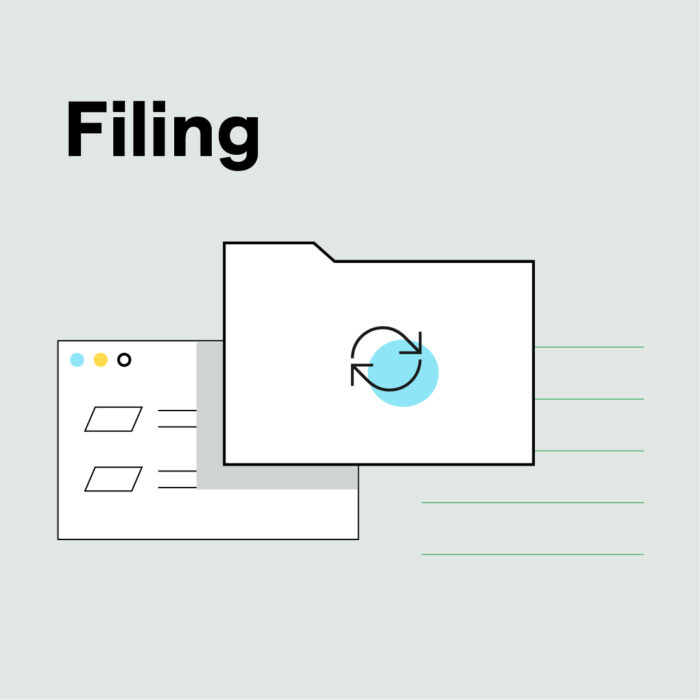Filing US sales tax
by March 8, 2025
Being sales tax compliant means collecting the proper amount of sales tax, and then remitting that sales tax to the appropriate state taxing authority. As is the case often in sales tax, there are a multitude of different factors to consider to successfully file your sales tax returns.
We’ll walk you through the key steps in the sales tax filing process to keep you compliant – and help you avoid fees and errors.
How to file US sales tax
Confirm you have the correct state information
Filing your sales tax returns means working with the state in which you have nexus. If you have sales tax nexus in multiple states, you will file a sales tax return in each of those states. Most states allow you to file your sales tax returns online, and some require it. Either way, each state’s sales tax return form looks different, so it’s important to start by locating the correct form for the state you are filing in – and making sure you are registered for the correct tax in your nexus state(s). Find your state on this map and see the instructions for how you can file manually in each state, including which form to use and if you can file online.
In order to file your sales tax return, it’s important to gather a few key documents and pieces of information.
Every state has specific requirements. Generally, we recommend:
- Your sales tax filing amounts for the applicable filing state and period
- Your Sales and Use Tax account number
- Your state-assigned filing frequency
- Your e-File electronic filing login details (if filing online)
- Your bank account number and routing number that you’d like to use for sales tax payment
Remit the correct amount of sales tax
Most states want you to report gross sales in each county, city or other special taxing districts. You may also need to consider your deductions and exemptions. These vary by state, but some common types of deductions include resale exemptions, sales tax exempt products, sales where taxes were collected by marketplace facilitators, and sales to exempt organizations. Most states also want you to report how much tax you’ve collected, including any tax in excess of the amount you owe. Accuracy is crucial when it comes to sales tax calculations.
Make sure to file a sales tax return every time you have a filing due, even if you don’t owe or didn’t collect any sales tax over the taxable period. If a seller fails to file, the state could charge a penalty or even revoke the seller’s sales tax license. Be prepared to file sales tax returns by the due date, every time.
File on time
At TaxJar, we recommend filing at least a few days early to avoid any problems with your filing and to deal with any state idiosyncrasies. State sales tax due dates vary, and it also depends on the filing frequency you are assigned. Don’t worry about keeping up with sales tax due dates with TaxJar’s AutoFile — an automatic electronic filing service for state sales tax. Simply enroll and TaxJar will use the information we receive from your e-commerce providers and marketplaces to prepare and submit returns to the state, along with remittance.
The states themselves determine the official filing frequency for each taxpayer–it can be either monthly, quarterly, semi-annually or annually, depending on the regulations of each state and your sales volume. Your filing frequency is assigned when you register for a sales tax permit. You must always report and remit according to the filing frequency schedule the state has assigned you. If you attempt to file with a payment schedule that does not match your state-assigned filing frequency, the states may assess penalty and interest fees on your account and you may be required to amend previous filings.
If you’ve registered for a sales tax permit and you’re not sure of your frequency, you can confirm the filing frequency the state has determined for you by contacting your state’s sales tax office.
It’s important to note that filing frequencies can change as your sales change. If you have nexus in multiple states, it can be very easy to confuse your filing frequencies and file on the wrong date.
Failing to file on time can result in a loss of any on-time filing discounts and late filing can lead to payment penalties plus interest on the outstanding amount of sales tax owed. In the event a sales tax return is filed late and a penalty is assessed, the seller can contact the state’s taxing authority and ask for a penalty waiver. It is up to the state’s discretion on whether a penalty will be waived. You can find here the list of phone numbers for every state’s taxing authority.
Other considerations
- Prepayments
- Certain states, California for example, and jurisdictions have implemented prepayment requirements for high volume sellers. A state will notify you if you are subject to prepayments. If a state requires you to make prepayments then you are required to make sales tax payments on a different, more accelerated schedule than normal sales tax filings. These prepayment due dates tend to fluctuate by state – so it’s important to be aware of specific state, city, and jurisdiction regulations for high volume sellers.
- Refunds
- When you refund sales tax to a customer for a sale that occured in a previous taxable period, states ask that you file an amended return for that previous taxable period in order to claim that credit.. The state will likely add this amount as a credit toward a future sales tax payment.
- Marketplace facilitator laws
- If you’ve determined you have physical or economic sales tax nexus in a state, you’ll also want to check to see if any of those states have passed marketplace facilitator laws. States which have active marketplace facilitator laws allow the marketplace facilitator, such as Amazon or Walmart, to collect sales tax on your behalf. It’s important to note that it is still your responsibility to report and file the sales tax collected.
- Sales tax discounts
- About 50% of states that charge sales tax encourage businesses to file on-time by providing a discount. In these states, on-time filers can retain a very small amount (usually 1-2%) of the sales tax collected. Here is a list of states with sales tax discounts.
Streamlining sales tax compliance with TaxJar
As you can see, sales tax compliance is challenging. There are so many important details that businesses must be aware of to stay compliant and avoid penalties. TaxJar can make compliance easier, by managing all the different aspects, including keeping you updated on where you have nexus, registering for sales tax permits, and automating sales tax filing and remittance. To learn more about TaxJar and get started automating your sales tax compliance, start a free, 30-day trial today.







